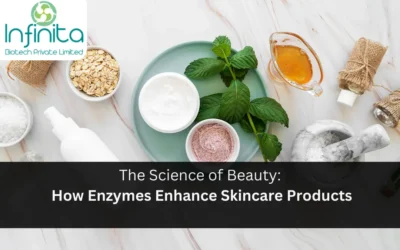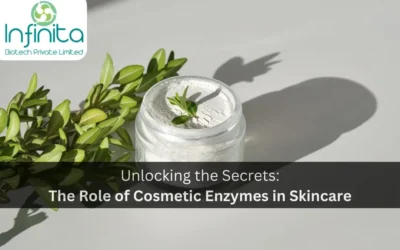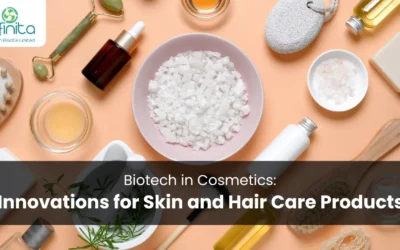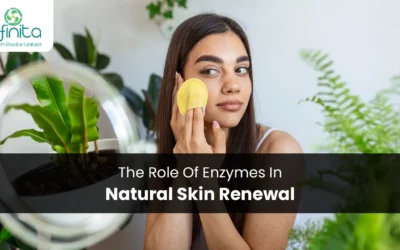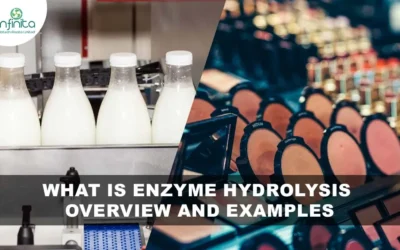Introduction
The beauty industry is undergoing a quiet revolution, driven by science and sustainability. In an era where consumers demand natural ingredients that work, biotechnology has stepped in to reshape how we think about skincare and beauty products. At the forefront of this transformation are enzymes, and biological catalysts that offer gentle, effective solutions for everything from exfoliation to anti-aging. These microscopic workers may very well power the future of beauty.
What is Biotechnology in Cosmetics?
2.1 An Overview of Biotechnology
Biotechnology harnesses the power of biology to develop products and technologies. It spans multiple industries, including healthcare, agriculture, and cosmetics. By using living organisms or their derivatives, biotechnology creates innovative ingredients that improve product efficacy.
2.2 The Intersection of Biotechnology and Beauty
Biotechnology allows us to create more potent, safer, and sustainable products in cosmetics. It’s not just about what nature gives us, but also about how science can optimize those natural processes to enhance beauty solutions. From enzyme-enhanced skincare to lab-grown active ingredients, biotechnology offers a future where products are not only more effective but also more ethical.
The Role of Enzymes in Cosmetics
3.1 What are Enzymes?
Enzymes are proteins that act as catalysts in biological reactions. In simple terms, they speed up processes in the body, such as breaking down dead skin cells or transforming oils and fats. Each enzyme is specific to the reaction it catalyzes, making it ideal for targeted treatments in cosmetics.
3.2 Why Enzymes are Essential for Skin Health
Enzymes naturally occur in our bodies and play an essential role in maintaining skin health. They assist in cellular regeneration, help remove toxins, and even combat free radicals. When applied topically through skincare products, enzymes continue their work, offering benefits like exfoliation, moisture retention, and defense against environmental damage.
Types of Enzymes Used in Cosmetics
4.1 Proteolytic Enzymes
These enzymes, such as papain from papaya and bromelain from pineapple, break down proteins, making them excellent for removing dead skin cells and impurities. Proteolytic enzymes are commonly found in exfoliating masks and treatments.
4.2 Antioxidant Enzymes
Enzymes like superoxide dismutase (SOD) act as powerful antioxidants. They help neutralize free radicals, which are molecules that cause oxidative stress and lead to premature aging. Incorporating these enzymes into skincare provides a defense mechanism for the skin against daily aggressors.
4.3 Lipolytic Enzymes
Lipolytic enzymes break down fats and oils, which is particularly useful in treating oily and acne-prone skin. By regulating sebum production, these enzymes can help maintain a balanced complexion without stripping the skin of its natural moisture.
Enzymes and Skin Exfoliation
5.1 How Enzymes Offer Gentle Exfoliation
Unlike physical exfoliants that can be harsh and abrasive, enzyme-based exfoliators gently dissolve dead skin cells. This leads to a smooth, glowing complexion without causing micro tears or irritation, making them ideal for sensitive skin.
5.2 Benefits of Enzyme-Based Exfoliants for Sensitive Skin
For those with sensitive or reactive skin, enzyme exfoliants offer a kinder alternative. They remove impurities and excess sebum without disrupting the skin barrier, helping to maintain moisture levels and protect against inflammation.
Anti-Aging Properties of Enzymes
6.1 How Enzymes Combat Oxidative Stress
Enzymes like SOD and catalase are integral in neutralizing free radicals, and reducing oxidative stress, which accelerates skin aging. By defending against these external threats, enzyme-based skincare products help preserve skin youthfulness.
6.2 Collagen Preservation Through Enzyme Activity
Certain enzymes boost collagen production by breaking down dead skin cells and stimulating fibroblasts—cells that are crucial in producing collagen. This process helps maintain the skin’s elasticity and firmness over time.
Enzymes in Skin Brightening
7.1 The Role of Enzymes in Melanin Regulation
Enzymes such as tyrosinase inhibitors are used in skin-brightening treatments to regulate melanin production. This can help reduce hyperpigmentation, age spots, and uneven skin tone, promoting a more radiant complexion.
7.2 Brightening Effects for Hyperpigmentation
Enzyme-based products are a non-invasive option for treating dark spots. By gradually reducing melanin buildup, they offer a safer and more gentle alternative to chemical peels and lasers.
Sustainable Beauty through Enzyme Technology
8.1 Eco-Friendly Sourcing of Enzymes
Enzymes used in cosmetics are often derived from natural sources like fruits, plants, and microbes. Biotechnological advancements ensure that these enzymes are sustainably sourced, minimizing the environmental impact while maintaining efficacy.
8.2 Reducing Waste in Cosmetic Production
Biotechnology helps reduce waste by enabling the production of high-potency ingredients with minimal resource consumption. Enzyme technology, in particular, allows for the efficient extraction and use of active compounds, reducing the need for synthetic chemicals.
Enzymes in Hair Care Products
9.1 Strengthening Hair with Enzyme-Based Shampoos
Enzymes such as protease help cleanse and strengthen hair by breaking down excess proteins and impurities. They can restore shine, strengthen strands, and promote healthier hair growth.
9.2 Enzymes in Hair Growth and Scalp Health
Enzymes that regulate oil production and improve scalp circulation are being incorporated into shampoos and scalp treatments. These formulations support hair follicle health and may even stimulate hair growth, offering solutions for thinning hair.
Biotechnology’s Role in Personalized Skincare
10.1 Tailoring Enzymatic Treatments to Individual Needs
With biotechnology, it is possible to create personalized skincare solutions tailored to individual skin needs. Enzymes can be selected and combined to address specific concerns like acne, ageing, or sensitivity, allowing for more targeted and effective treatments.
10.2 Biotechnological Advances in Custom Formulations
The future of enzyme-based cosmetics lies in custom formulations where products are designed based on individual skin types and conditions. These advancements could revolutionize the way we approach beauty, offering bespoke solutions that maximize results.
Challenges in Enzyme-Based Cosmetics
11.1 Stability and Preservation of Enzymes in Formulations
One challenge in enzyme-based cosmetics is ensuring that the enzymes remain active and stable throughout the product’s shelf life. Exposure to heat, light, or certain preservatives can degrade enzyme efficacy, making formulation a critical aspect of product development.
11.2 Overcoming Consumer Misconceptions
Many consumers are still unaware of the benefits of enzymes in skincare. Educating the public about the effectiveness and safety of enzyme-based products is essential for widespread adoption and acceptance in the beauty industry.
Conclusion: The Future of Biotechnology in Beauty
Enzymes are reshaping the landscape of the beauty industry, offering gentle yet effective solutions for skin and hair care. Through biotechnology, the use of enzymes in cosmetics promises not only enhanced product performance but also sustainability and personalization. As science continues to evolve, enzyme-based products will play a pivotal role in the future of beauty, making skincare and hair care more efficient, eco-friendly, and tailored to individual needs.
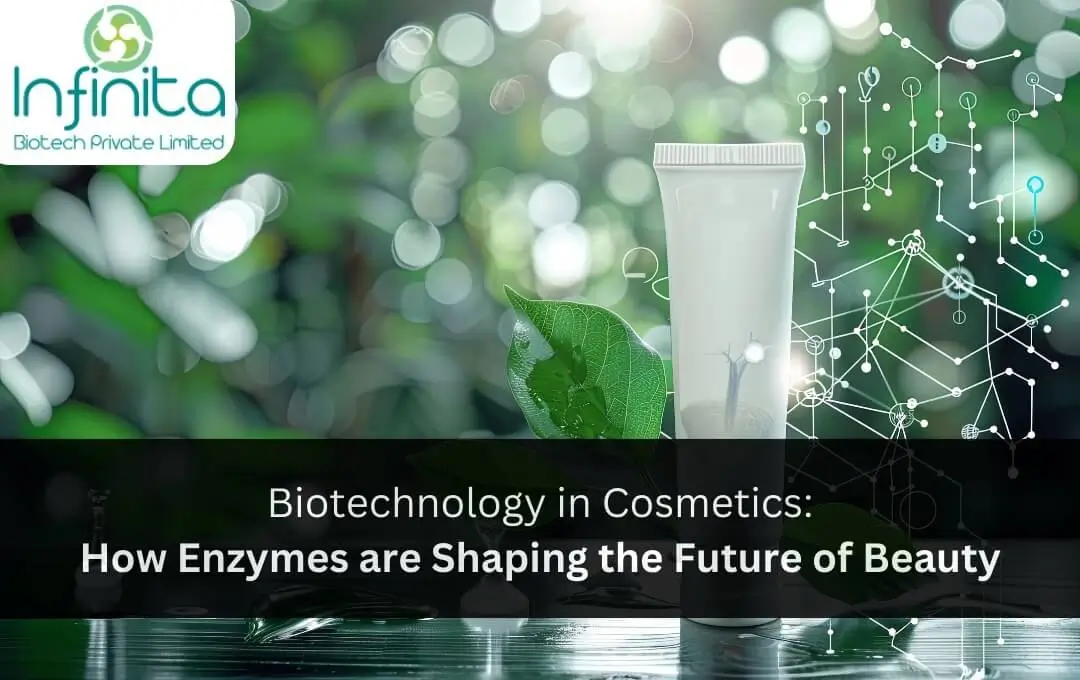
 Summarize this Article with AI
Summarize this Article with AI
